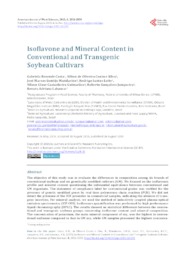Isoflavone and mineral content in conventional and transgenic soybean cultivars.
Isoflavone and mineral content in conventional and transgenic soybean cultivars.
Author(s): COSTA, G. R.; SILVA, N. de O. C. e; MANDARINO, J. M. G.; LEITE, R. S.; GUIMARÃES, N. C. C.; JUNQUEIRA, R. G.; LABANCA, R. A.
Summary: The objective of this study was to evaluate the differences in composition among six brands of conventional soybean and six genetically modified cultivars (GM). We focused on the isoflavones profile and mineral content questioning the substantial equivalence between conventional and GM organisms. The statement of compliance label for conventional grains was verified for the presence of genetic modified genes by real time polymerase chain reaction (PCR). We did not detect the presence of the 35S promoter in commercial samples, indicating the absence of transgene insertion. For mineral analysis, we used the method of inductively coupled plasma-optical emission spectrometry (ICP-OES). Isoflavones quantification was performed by high performance liquid chromatography (HPLC). The results showed no statistical difference between the conventional and transgenic soybean groups concerning isoflavone content and mineral composition. The concentration of potassium, the main mineral component of soy, was the highest in conventional soybeans compared to that in GM soy, while GM samples presented the highest concentrations of iron.
Publication year: 2015
Types of publication: Journal article
Unit: Embrapa Soybean
Keywords: Genetically modified organisms, Organismo transgênico, Soja, Soybeans
Observation
Some of Embrapa's publications are published as ePub files. To read them, use or download one of the following free software options to your computer or mobile device. Android: Google Play Books; IOS: iBooks; Windows and Linux: Calibre.
Access other publications
Access the Agricultural Research Database (BDPA) to consult Embrapa's full library collection and records.
Visit Embrapa Bookstore to purchase books and other publications sold by Embrapa.

